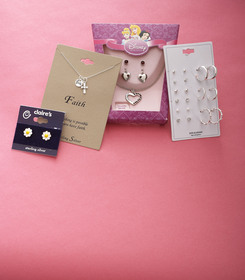NEW YORK, NY--(Marketwire - June 17, 2010) - Young girls' jewelry is shiny and pretty, but as Good Housekeeping found, it could also be dangerous. The Good Housekeeping Research Institute, the magazine's legendary product testing laboratory, tested dainty earrings and necklaces from Claire's, Target and Walmart for heavy metals, including lead and cadmium, which can be poisonous if ingested. Good Housekeeping found that every piece of jewelry tested greatly exceeded the government's lead limit allowed for children's products, including a stud earring which contained 124 times the permissible level, and a Disney-branded earring that contained 47 times the government-mandated limit. In addition, most pieces contained cadmium, which has been the culprit in a number of recent jewelry recalls.
Regardless of warning labels indicating the jewelry was not intended for children under age 7, 12, or 14, the pieces evaluated by the Research Institute have obvious kid appeal because of the small size and kid-friendly design. The law defining a "children's product" is currently in flux. In April 2010, the Consumer Product Safety Commission (CPSC) proposed to clarify the definition of a "children's product." As the CPSC noted, if a product appeals to young children, even if labeled for children over the age of 12, the product should still be required to adhere to safety regulations for children's products. The Good Housekeeping Research Institute strongly supports this.
"Kids often put jewelry and other trinkets into their mouths -- and that's where the danger is. It's alarming that manufacturers are still selling potentially dangerous products to children," said Rosemary Ellis, editor in chief of Good Housekeeping. "For the protection of children around the country, we urge the CPSC to immediately issue a recall of these items."
As consumer advocates, the Research Institute is constantly evaluating products for misleading labeling and advertising in the marketplace.
Due to the Research Institute's recent findings and the history of product recalls in this category, Good Housekeeping recommends parents avoid purchasing any inexpensive jewelry for children. Even a "sterling silver" label is no guarantee of safety. Some of the pieces the Research Institute evaluated were labeled "sterling silver," which means made from 92.5 percent pure silver, and yet they also contained hazardous heavy metals. As a precaution, keep all jewelry out of reach of small children, who may swallow it and risk being poisoned or choking. If a child does swallow a trinket that may contain lead or cadmium, Good Housekeeping recommends immediately calling Poison Control at 800.222.1222.
For more about Good Housekeeping's children's jewelry test, visit: www.goodhousekeeping.com/kidsjewelry.
About Good Housekeeping
Founded in 1885, Good Housekeeping (www.goodhousekeeping.com) magazine reaches 25 million readers each month. The Good Housekeeping Research Institute, the consumer product evaluation laboratory of the magazine founded in 1900, is dedicated to improving the lives of consumers and their families through education and product evaluation. Before any advertisement appears in the magazine, it must first pass the Good Housekeeping Research Institute's evaluations, and thereby become eligible to display the Good Housekeeping Seal. Products that have earned the Good Housekeeping Seal carry a limited warranty: if the product proves to be defective within two years of purchase, Good Housekeeping will replace the item or refund the consumer. Readers can also interact with the brand with Good Housekeeping mobile (m.goodhousekeeping.com). In addition to its U.S. flagship, Good Housekeeping publishes 15 editions around the world. Hearst Magazines is a unit of Hearst Corporation (www.hearst.com) and is one of the world's largest publishers of monthly magazines, with nearly 200 editions around the world, including 15 U.S. titles and 20 magazines in the United Kingdom, published through its wholly-owned subsidiary, The National Magazine Company Limited. Hearst reaches more adults than any other publisher of monthly magazines (73.8 million total adults, according to MRI, Fall 2009).
Contact Information:
Media contact:
For more information about Good Housekeeping, the Research Institute or to schedule an interview, please contact:
Kelly Carone Abdo
212.649.2321
kcaroneabdo@hearst.com
